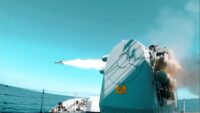June 14, 2021: A Chinese spacecraft will launch off from the Gobi Desert on a Long March rocket in the coming days, carrying three people on a space module for a three-month stay.
Sent into space The Shenzhou-12, meaning “Divine Vessel,” will be the third of 11 missions needed to complete China’s space station by 2022. Four of them will be on missions with people on board, possibly advancing 12 Chinese astronauts into space. China has sent 11 men and women since 2003.
This craft will also take some of the hopes of the world’s most populous country into space. One user wrote on Chinese social media, “The motherland is powerful.” expressing good wishes for the staff of Shenzhou 12. “The launch is a gift to the 100th anniversary of the founding of the Communist Party.”
Chinese astronauts have a relatively low international profile. US law banning NASA in any way with China means that its astronauts did not visit the International Space Station more than two decades ago, in which more than 240 men and women of different nationalities flew. It also intends to land astronauts on the moon – the farthest celestial body in which humans have traveled.
The Shenzhou-12 crew is based in Tianhe, a “paradise of harmony”, with a cylinder 16.6 meters (55 feet) long and 4.2 meters (14 feet) in diameter. The planned three-month stay will break the country’s 30-day record, set under the 2016 mission.
The director of China’s Manned Space Engineering Office and China’s first astronaut, the first and second batch of Chinese astronauts, will be on the mission, the official tabloid told the Global Times last month. Chinese space bloggers speculate that he will be Ni Haisheng – who will be China’s oldest astronaut at 56 – Deng Qing, 55, and Ye Guangfu, 40.
Authorities do not usually announce mission personnel near or after the launch. The oldest man in space was John Glenn, who flew the space shuttle in 1998 at the age of 77. He was a U.S. senator and presidential candidate since becoming the first American to orbit the Earth in 1962. Yang told Global Times that although no women are scheduled for the Shenzhou-12 mission, they are expected to take part in every expected mission.
Two women, Liu Yang and Wang Yaping, were selected in 2011 among China’s second cohort, after the first batch of 14 men in the mid-1990s. Liu was China’s first woman in space in 2012, while Wang was the youngest, at 33, in 2013.
China began building its space station in April with the launch of Tianhe, the first and largest of its three modules. This year it aims to send a robotic cargo resupply spacecraft and three more astronauts, this time for a six-month stay.
Stay tuned to BaaghiTV for latest news and Updates!






